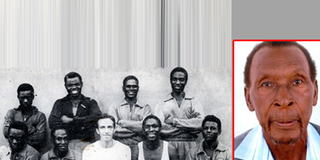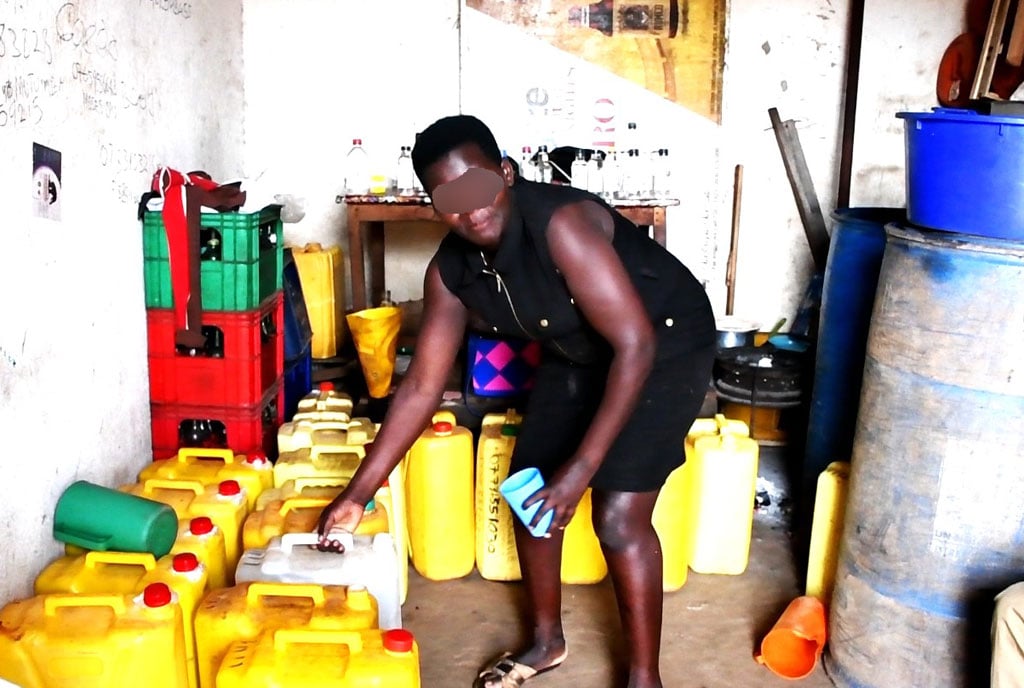Prime
Kawere won East Africa’s first international boxing medal

Kawere (INSET) as he appears today. In the left picture, Kawere (seated second right) posing with Uganda’s national boxing team in 1964.
What you need to know:
Kawere factfile
Born - June 1, 1927
1944-59 - School, national and international boxer.
1945-49 - Namilyango College Boxing captain.
1949 - Represented Uganda as a sprinter.
1949-50 - Member of Uganda football squad and Nsambya football club.
1951-58 - Captain Uganda boxing team.
1951-58 - Undefeated in Uganda and East Africa.
1958 - Won Commonwealth Silver Medal at Welter weight.
Who was the first boxer from Uganda and East Africa to win a medal in an international or global tournament? The answer is Tom Kawere. Actually talking about the history of boxing in this country without mentioning the name Tom Kawere is like giving a lecture on Christianity without referring to the Bible.
Thomas Nseremye Kawere, the grandson of the great Buganda kingdom chief and regent, Stanislas Mugwanya has trained more Ugandan boxers than any coach in history.
Those to have gone through his hands as coach of the Ugandan National team, founder of Kampala boxing club and at one time as coach of Namilyango College and St Peters Nsambya include Major General Francis Nyangweso, Ayub Kalule, Grace Sseruwagi, John ‘the Beast ‘Mugabi, Francis Kisekka and even former president Idi Amin Dada.
Kawere’s keen interest in boxing started during the time he used to stay at his grandfather’s (Mugwanya) home in Bukerere where former president and Kabaka of Buganda Sir Edward Muteesa II too stayed for a while. The two would play a number of sports including boxing and football.
His serious participation in boxing however came when he joined Namilyango College in 1945. He was an all rounder who would play football, cricket, athletics and boxing. He had to abandon cricket when a ball one day hit and badly injured his nose. “This was when I decided to concentrate on boxing with friends teasing me and wondering how I could give up cricket just because of an injured nose and then embrace boxing which appeared a more dangerous sport.”
At Namilyango, Kawere became too good at boxing that he was appointed the school boxing captain in 1945, a position he held up to 1949 when he left the school. After completing studies at Namilyango, Kawere joined the Ministry of Public Relations and Social Welfare as a clerk in 1950 before shifting to Hunt and Greg, a renowned law firm.
Between 1960-1977, he was the sports officer Ministry of Culture and Community development and was at the same time seconded to the National Council of Sports, with a duty to arrange courses and competitions in athletics, boxing and handball among other sports.
Earlier on in 1959, Kawere was appointed Ugandan national boxing coach, a post he held for over a decade. Between 1963-1965, he was member and treasurer of the Uganda Amateur Athletics Association. From 1960 to 1965, he was a member of the Ugandan Olympic Committee before being appointed administrative secretary, National Council of Sports (1977-1981).
In mid 50s, he formed the Kampala Boxing Club with an aim of grooming boxers many of whom ended up bringing glory to the nation. “Former president Idi Amin used to train from here when still at the military rank of Lance Corporal. Amin was such a hardworking and determined heavy weight boxer who would easily grasp whatever trick a taught him,” Kawere recalls.
Amin offer
Later as president of Uganda, Amin would ensure a steady flow of cash to the promotion of boxing in the country. “As coach and later official of the Ugandan boxing team, Amin gave me his direct telephone number which I would call in case of any problem ahead of a big tournament here and abroad. One day, my secretary could not believe it when Amin himself called and requested to talk to Tom. He wanted me to go to his office immediately and on reaching there he handed me $2,000 dollar notes to distribute to boxers while on an away trip, arguing that this would help motivate them.”
Amin would always tell the coach and boxing officials to remind boxers to aim at nothing but only knock-outs. This according to him, was the only way of avoiding biased refereeing and judging.
Kawere says that throughout his career, he never lost a boxing match in East Africa. And what some refer to him as being defeated was actually never true. “It was in the finals of the 1958 Empire Games (Now Commonwealth) held in Cardiff, U.K when I convincingly defeated my opponent, a Scot in welter weight. All the judges ruled in my favour but to everyone’s surprise, the referee lifted the Scot’s hand, declaring him victorious.”
Robbery?
According to Kawere, the following morning all British papers carried news of the robbery with the referee later being suspended and never allowed to officiate in the 1960 Olympics. Kawere says he was the only Ugandan boxer and East African to win a medal at these Commonwealth Games.
This sad moment was mainly responsible for him shunning the professional ranks when later approached by a number of promoters from Europe and America. “I totally turned them away. My mind told me if they could cheat me at such a prestigious and much publicised tournament, what would happen if I decided to relocate to their land?” He describes himself as a boxer who hardly took his opponents beyond the third round. “During my time, fans would always keep time, well knowing that late coming would make them miss the contest,” he boasted.
But what was the secret behind Kawere’s successful boxing story? Dancing he says. “There is a close link between dancing and boxing. A good dancer tends to have or develop the sort of footwork that good boxers require for success. Boxing is not all about being powerful or having a lot of strength but possessing good footwork, style in addition to having brains to study one’s opponent.” he says.
The best example of an international boxer that combined all the four qualities is American Mohamed Ali.
Training with Ali
During the 1960 Olympic Games held in Rome where he was Uganda boxing team coach, Kawere allowed Ali (when still known as Classius Clay) to train at the Ugandan camp. “Ali came at our camp , requesting to train with us in order to study and gauge the capability of African boxers. We were very privileged to have him and didn’t turn him away, for we also wanted to learn a lot from such a highly skilled boxer.”
And talking about his dancing skills, Kawere told me how during the 1950s he used to dance a lot at Budo club which was situated near Kisenyi. “We were great friends with the late dancing wizard, Christopher Kato and the moment the two of us stepped on stage, no one would dare come or challenge us,” he recalls with a smile.
He was among the few old boys of Namilyango College recognized during the school’s centennial celebrations held 10 years ago. He was singled out for captaining the school’s boxing team between 1945-49 and in addition, for later sparing time to coach the boys and uplift the standard of the school’s boxing team.
Even Amin appreciated his services and decided to reward him in a big way. After the expulsion of Asians, he ordered Major General Isaac Maliyamungu to give Kawere a giant sports shop along Kampala road.
But because several senior army officers too eyed the property, Kawere feared for his life and rejected the offer. Maliyamungu, whom Kawere had at one time taught boxing skills tried to convince him not to fear, but Kawere stuck to his guns.
Kawere’s sports qualifications included becoming a Uganda Boxing Association referee and judge in 1956, obtaining a bronze medal at Royal Life Saving Society, (U.K) in 1962, qualifying as an Amateur Athletic Association (U.K) coach in 1962 and as International Boxing Association judge in 1974. Between 1961-1962, Kawere attended Loughborough College of Physical Education in U.K.
Kawere married his wife Christina Nampeera Kawere on September 25, 1953. They are blessed with six girls and three boys.




